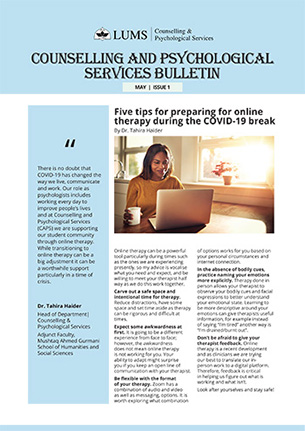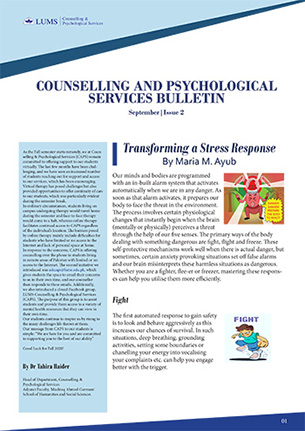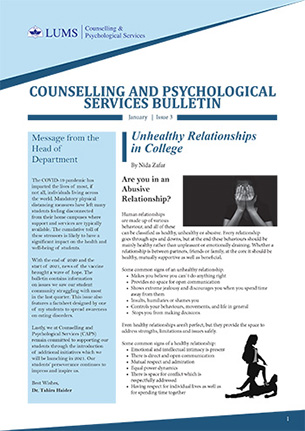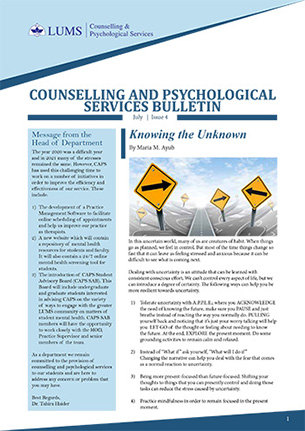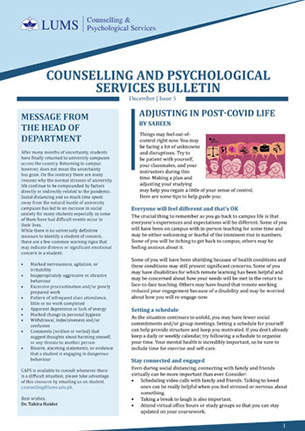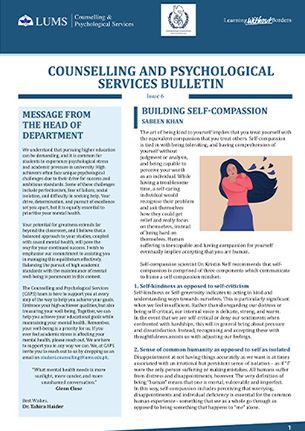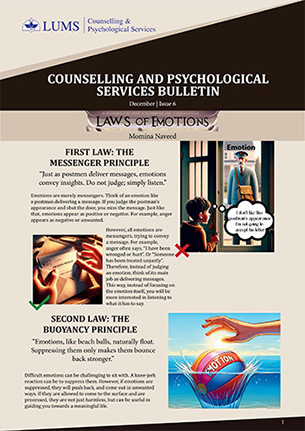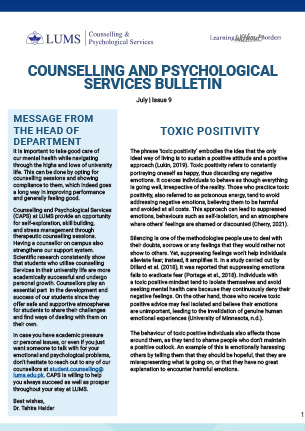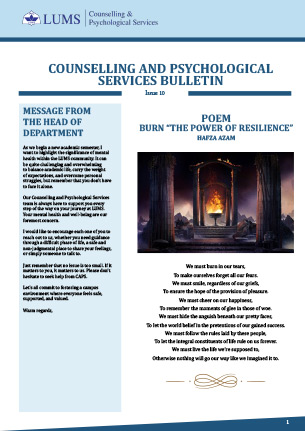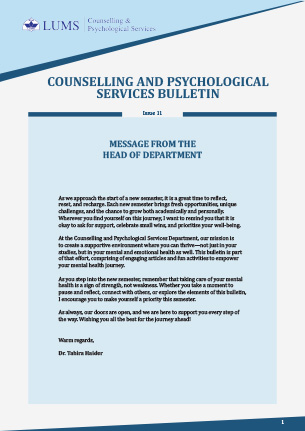CAPS Staff Publication
- CAPS publishes a quarterly bulletin which encapsulates issues and concerns which are current for our students.
- The Bulletin contains advice, tips, techniques and resources regarding mental health and well-being.
This is a list of articles that our staff have been involved with either as authors or co-authors.
Publications
Clark, L., Hudson, J., and Haider, T. (2020). Anxiety Specific Mental Health Stigma and Help-Seeking in Adolescent Males. Journal of Child and Family Studies. https://doi.org/10.1007/s10826-019-01686-0
Haider, T., Dunstan, D., & Bhullar, N. (2018). Psychologist’s application of clinical guidelines and recommended protocols & procedures within State Insurance Regulatory Authority insurance frameworks: Outcomes for injured patients with musculoskeletal injuries. Australian Psychlogist.doi:10.1111/ap.12354
Haider, T. and Dunstan, D. (2019). Barriers to psychologist’s adherence to evidence-based practice guidelines for treating musculoskeletal injuries within the State Insurance Regulatory Authority Insurance Frameworks. International Journal of Disability Management. doi:10.1017/idm.2019.2
Haider, T. and Dunstan, D. (2019). Understanding the Barriers Impacting Psychologists’ Adherence to Evidence-Based Treatment Guidelines from a Stakeholder Standpoint. Australian Journal of Rehabilitation Counselling. doi: 10.1017/jrc.2019.12
Haider, T., Dunstan, D., & Bhullar, N. (2019). Improving Psychologists Adherence to Evidence Based Practice Guidelines for Treating Musculoskeletal Injuries: Feasibility Evaluation. Australian Psychologist. doi: 10.1111/ap.12395.
Dunstan, D.A. and Haider, T. (2016). Assessing the Impact of the Psychologists andCounsellors’ Guide to WorkCover NSW. Armidale, NSW: University of New England. Retrieved from here.
- Iftikhar, M., & Schwaiger, E. M. (2023). Relationship between Family Functioning, Personality Traits, and Psychological Health in Clinical Psychology Trainees. Journal of Professional & Applied Psychology, 4(1), 42-52 https://www.researchgate.net/publication/369041617_Relationship_between_Family_Functioning_Personality_Traits_and_Psychological_Health_in_Clinical_Psychology_Trainees
- Khan, S., & Khalid, R. (2020). Narcissism, Personality Traits and Conspicuous Consumption of Brand in Youth. European Journal of Behavioral Sciences, 2(3), 20–28. https://doi.org/10.33422/ejbs.v2i3.152
Presentations
Haider, T. (2018). Evidence-based practice used by psychologists within the Motor Accident Insurance Regulation/State Insurance Regulatory Authority. Presented at State Insurance Regulatory Authority, NSW Government, Sydney, Australia.
Haider, T., & Dunstan, D. (2016, October). Does a regulatory framework for psychologists practice improve the outcomes for injured workers with low back pain and the practice of treating psychologists? Paper presented at Personal Injury and Disability Management Conference, Sydney, Australia.
Haider, T., & Dunstan, D. (2016, September). Does a regulatory framework for psychologists practice improve the outcomes for injured workers with low back pain and the practice of treating psychologists? Paper presented at the Fourth Work Disability Prevention and Integration Conference, Amsterdam, Netherlands. Abstract retrieved from http://www.wdpi2016.org/images/WDPI_Science-programme-2016-LR2.pdf
Haider, T., & Dunstan, D. (2016, August). Does a regulatory framework for psychologists practice improve the outcomes for injured workers with low back pain and the practice of treating psychologists? Poster session presented at the 2016 Australian Psychological Society Congress, Melbourne, Australia. Abstract retrieved from https://events.psychology.org.au/ei/speakers/2016APSCongress_AbstractBook.PDF


